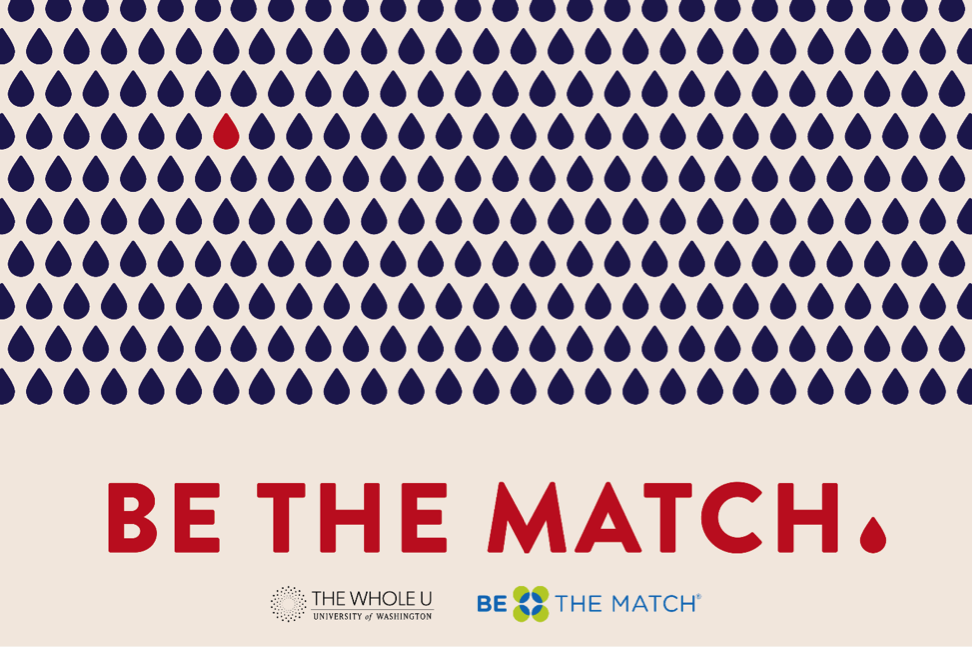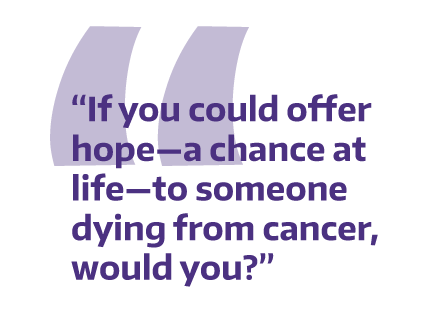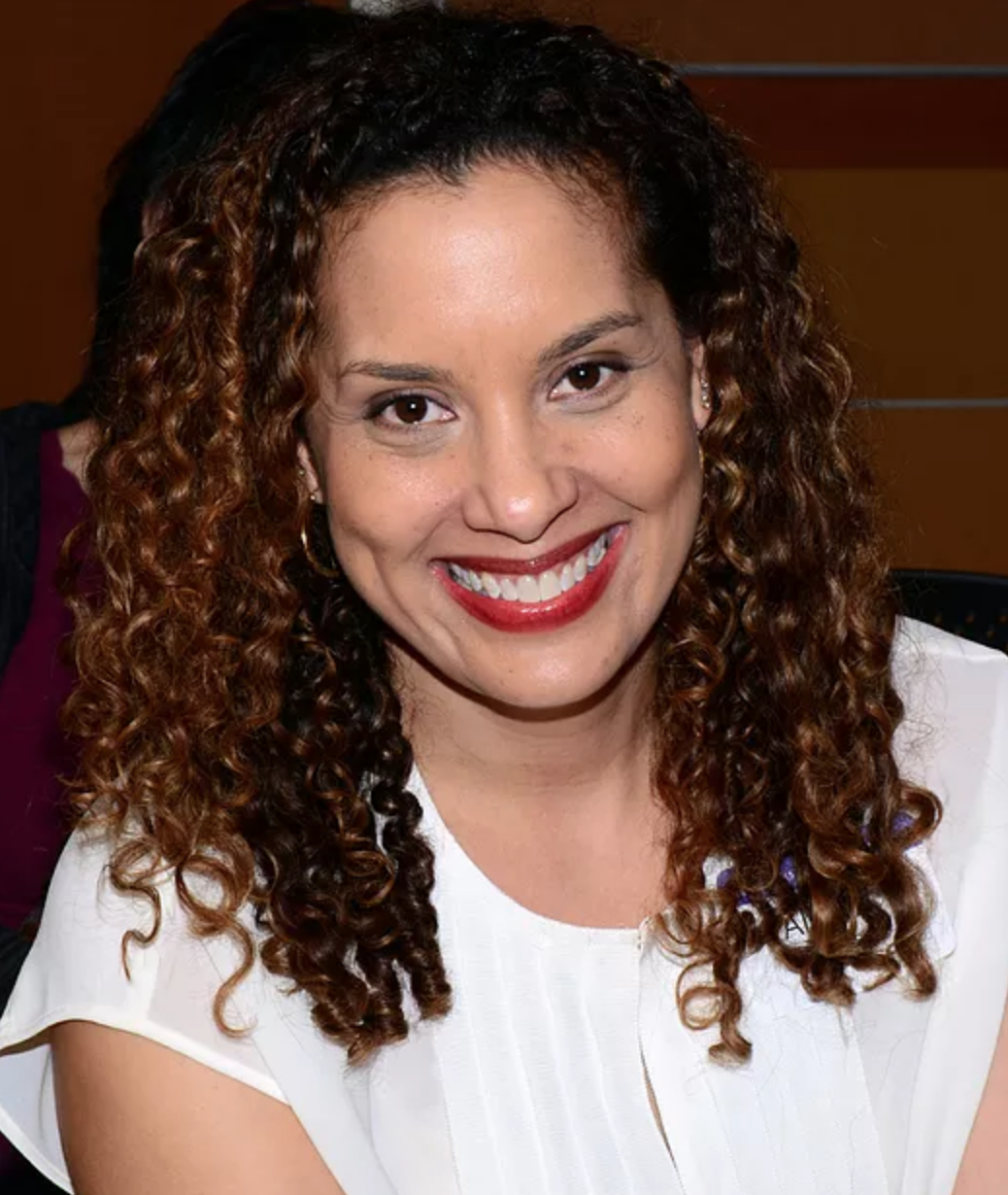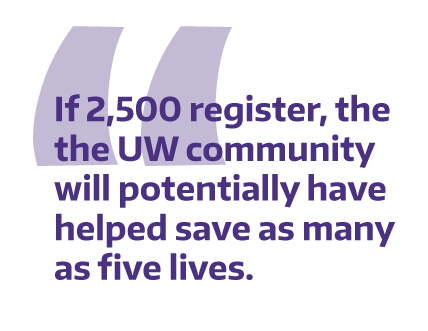
UW launches partnership to ‘Be the Match’
 When you think of what it takes to cure cancer, what comes to mind? Vast, high-tech labs? White-coated technicians? Cutting-edge science happening on the smallest cellular scale? You wouldn’t be wrong, but then again, curing cancer also happens on an individual level—person-to-person and every day.
When you think of what it takes to cure cancer, what comes to mind? Vast, high-tech labs? White-coated technicians? Cutting-edge science happening on the smallest cellular scale? You wouldn’t be wrong, but then again, curing cancer also happens on an individual level—person-to-person and every day.
That’s the idea behind the University of Washington’s new partnership with Be the Match—the first of its kind between a university and the world’s largest and most diverse marrow registry.
“Any person has the power to cure cancer,” says Tori Fairhurst, Be the Match’s community partnership manager for the West Coast. “If you could offer hope—a chance at life—to someone dying from cancer, would you?”
At present, there are 82 diseases that can be cured with a marrow or stem cell transplant, but only 30% of the patients who need a transplant are able to find a donor who is a perfect match within their own family. That means there are some 14,000 patients whose only chance of survival is a marrow or stem cell transplant from a complete stranger.
“Percentages of people who never find matches is devastating,” Fairhurst says. It is especially difficult for people of mixed race ancestry, for whom the percentage chance of finding a perfect match is skewed because ethnically diverse donors are underrepresented on the registry.
No one knows that stark reality better than Dr. Alexes Harris, a professor of sociology at the University of Washington whose ethnic background is African American, Filipino, and Caucasian. She was diagnosed with a rare blood cancer in 2016. A marrow or stem cell transplant was her only hope at a cure, but it was exceedingly difficult to find a 100% match.

A professor of sociology at the University of Washington, Alexes Harris was diagnosed with a rare blood cancer in 2016.
“We immediately started research to learn about how matches were found and I discovered that finding a non-related full match is difficult if you are a person of color, especially of mixed race origin,” Harris says.
While Caucasians have a 75% chance of finding a full match in the existing bone marrow registry, African Americans only have a 19% likelihood of finding a match and comprise only 7% of the United States registry. Within the U.S. registry, the likelihood for finding a full match is higher for people of Mexican (37%), Chinese (41%), South Asian (33%), Hispanic Caribbean (40%) and Native American (52%) ancestry than for African Americans, but still significantly lower than the likelihood for Caucasians.
Today, Harris is in recovery and living cancer-free, having received a successful stem cell transplant using umbilical cord blood at Seattle Cancer Care Alliance. But the experience gave her a sense of the harrowing need for more diverse donors as well as hope that the community could be a force for immediate impact—at UW and beyond.
“When it comes to bone marrow donation, and other blood products and organ donation, we can make a difference,” Harris says. “We can, for ourselves, save ourselves.”
On November 5, the UW and Be the Match are officially kicking off their new partnership at a Whole U-sponsored panel and screening of the documentary Mixed Match on the importance of race in healthcare and the pressing, ever-present need for diverse marrow donors. Held in the HUB South Ballroom from 5:30–7:30 p.m. with light refreshments (doors will open at 5 p.m.), the panel and screening will be just the first in a series of donor registry events across the UW and at the intersection of both the UW’s Population Health and Race & Equity Initiatives.
Register to attend as faculty and staff or as a member of the community.
The UW’s goal is to add more than 2,500 people to the registry. Joining the registry is simple: go to Join.BeTheMatch.org/UW and complete the registration online. A few days later, two cheek swabs will arrive by mail. Simply swab and return them in the postage paid envelope. Every person who registers increases the chances that ethnically diverse cancer patients eagerly awaiting news of a perfect match will receive one.
Only 1 in 430 on the registry will be a close enough match to donate to a specific patient. So if 2,500 register as part of this initiative, the UW community has the potential to save as many as five lives.

So, please join us November 5 in solidarity and celebration of this next step in Washington’s ongoing leadership on this issue.
Decades ago, research and treatment done in collaboration between UW and the Fred Hutchinson Cancer Research Center and the UW—including one of the first live marrow transplants—was integral to the establishment of the first bone marrow registry. Washington continues to be a national leader in the drive for diverse donor registry.
The UW’s partnership with Be the Match is a powerful indicator of what our community stands for and believes in—endeavoring to close gaps of inequality and improve the health and wellbeing of people in our own backyard and around the world.
Even if you’re not sure about being a potential marrow donor, we encourage you to join us on November 5 to learn more about the need and what is being done. You or someone you know could be the match for someone fighting for their life.